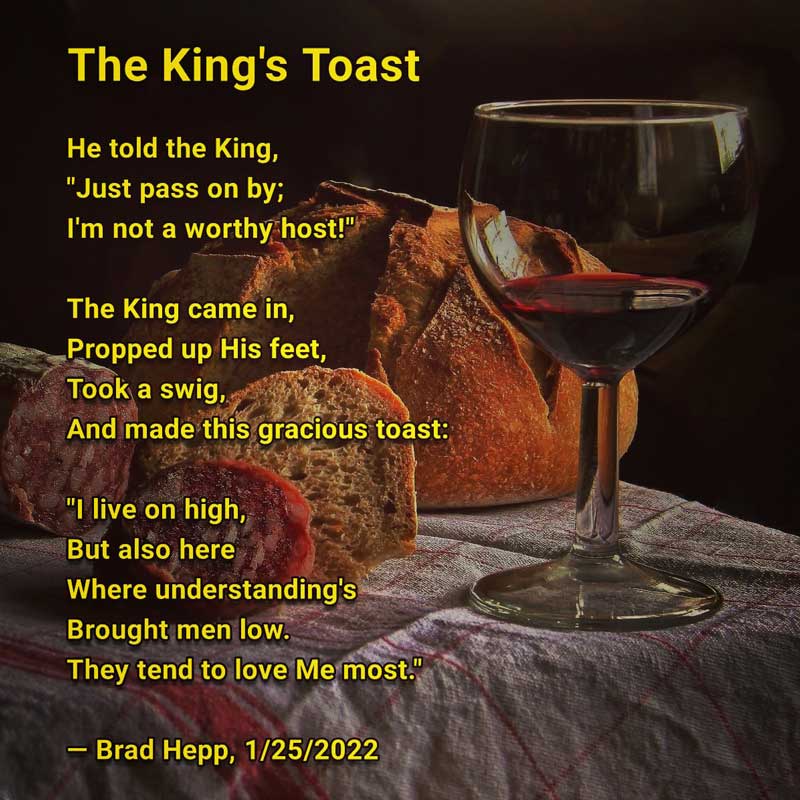
Commentary
I hope it’s not arrogant to say, “I like this poem.” Here’s why….
First, The Easy Stuff
I like how a poem can suggest a whole story in just a few words. Who is “He” who “told the King”? I didn’t have to describe him or do any character development. “He” is a humble man with a home the King can enter.
I like how the King’s easy familiarity can be established with just a “propped up his feet” and “took a swig.”
Finally, I like how poetry enabled me to to build a story around a verse that impressed me so much: Isaiah 57:15 (see below, where that verse brings possible resolution to a vexing question).
The Spirit in Which I Wrote This (By the way, the following is a meandering rumination. As you’ll see, I don’t end where I began)
Recently, I have been thinking about what effect it would have on a person if they were fully aware of God’s presence in their life. I mean, what if they could see him literally, physically walking with them in the park? Literally sitting beside them in the office? Literally sitting in the passenger seat of their car as they drive on the freeway?
I can’t help but think that it would regulate their behavior. Right? What about awareness of God’s actual, though not physical presence?
Someone wrote a book about this (at least that’s what I assume the book is about):
I’ll get around to reading Brother Lawrence’s little book sometime soon. But first, I need to think about this on my own…. So I pay attention. I watch for clues as I read or listen to the Bible.
Here was the first clue. I was listening through Isaiah, and came to this beautiful passage in Isaiah 11.
The wolf shall dwell with the lamb, and the leopard shall lie down with the young goat, and the calf and the lion and the fattened calf together; and a little child shall lead them. The cow and the bear shall graze; their young shall lie down together; and the lion shall eat straw like the ox. The nursing child shall play over the hole of the cobra, and the weaned child shall put his hand on the adder’s den. They shall not hurt or destroy in all my holy mountain; for the earth shall be full of the knowledge of the Lord as the waters cover the sea.
Isaiah 11:6-9
Isaiah describes a time when the knowledge of the Lord will regulate even the animals’ behavior. How? I can imagine human beings possessing special knowledge, intellectually understanding facts about the Lord. But animals? They are the ones whose behavior is regulated in this passage. So, I’m guessing the “knowledge” is more akin to “awareness.” Awareness of the Lord will be so thorough that even otherwise dangerous animals will not hurt or destroy.
So, this passage seems to support my theory that awareness of God’s presence would help regulate our behavior. How do we tap into that behavior-regulating awareness?
How About the Holy Spirit? Is He the Answer? Aren’t We Aware of Him?
In God’s current arrangement with man, He causes the Holy Spirit to indwell every believer. Problem solved, right? No. The indwelling is no guarantee of awareness. Ask any longtime believer!
If He’s Indwelling Me, Why Doesn’t He Make Himself Known? Or Does He?
Does familiarity cause us to drift in and out of awareness of the indwelling Holy Spirit? Is this just the best we can expect from an ongoing relationship? Some speak of God–including the Holy Spirit–as a “gentleman.” They might say, “He doesn’t impose on us, intrude in our thinking, but like a very quiet guest simply waits in the guest room for us to call Him to the dinner table or to the parlor for a good conversation.” In this scenario, He’s present, but we’re not aware of him, and that’s all we can expect if we don’t summon Him.
That sounds pretty passive on God’s part.
But another passage, also in Isaiah, starts to shift my thinking:
For this is what the high and exalted One says— he who lives forever, whose name is holy: “I live in a high and holy place, but also with the one who is contrite and lowly in spirit, to revive the spirit of the lowly and to revive the heart of the contrite.”
Isaiah 57:15 (NIV)
It seems that this passage describes an indwelling WITH awareness. Here, the indwelt person experiences revival. It seems reasonable to guess that this revival is effective, noticeable encouragement. It’s not just God saying “Cheer up there, fella.” It’s God succeeding in cheering him up. NOTICE THIS IMPORTANT OBSERVATION: The awareness of God here is an awareness of what He has done, not an awareness that enables us to do something. It may come around to that, but awareness here is the result, not the cause. That may take a moment to sink in.
If Awareness Isn’t the Magic Key, What Is?
To whom does God grant such awareness? Who does He actively encourage? To whom does He say “I’m staying in your home. I’m sharing this drink with you. Cheers!” Is it someone who puts up a little shrine to God in every room? Someone who ties a “remember God” string around his finger? Perhaps. It could happen. But it is certainly to the “contrite and lowly in spirit.” That’s who.
Why am exploring this awareness of God? It’s because I wish for God to regulate my behavior. I really do. For instance, I pray often that He’ll make me a noticeably kinder, more generous person. In this and other areas, do I start by recognizing my brokenness and my inability to change apart from His work in my heart?
Will I experience His encouraging, “YES, I will change you… I AM changing you!”?
First, I must ask, “Am I contrite and lowly in spirit?” It seems that’s where it begins.
Closely related: “To a Misguided Cedar.” Also, the following poem, that was a prequel, although I published it later: “Adam Gets Tripped Up.”
(background image by “3938030” on Pixabay)
